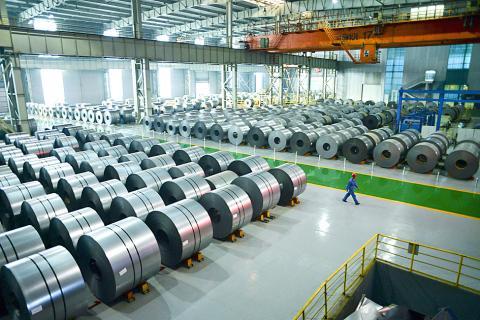Taiwan has failed to obtain an exclusion from a list of nations whose exports of steel and aluminum to the US are to be targeted by tariffs.
US President Donald Trump has signed proclamations allowing relief from quotas on steel from South Korea, Brazil and Argentina, as well as on aluminum from Argentina, the US Department of Commerce said in a statement on Wednesday.
“Companies can apply for product exclusions based on insufficient quantity or quality available from US steel or aluminum producers,” the statement said. “In such cases, an exclusion from the quota may be granted and no tariff will be owed.”

Photo: AFP
Citing national security concerns, Trump in March signed an order under Section 232 of the US’ Trade Expansion Act of 1962 to impose a 25 percent tariff on imported steel and a 10 percent tariff on aluminum.
US Secretary of Commerce Wilbur Ross at the time said the move was meant to deliver on Trump’s promises to US workers and enterprises.
Taiwan was the ninth-largest source of steel imports to the US last year, while Brazil, South Korea and Argentina were the second, third and sixth-largest respectively, department statistics showed.
Ross on May 31 said arrangements had been made with some countries to have non-tariff limits on their exports of the two metals to the US.
For instance, the arrangement with South Korea was for a quota of 70 percent of average steel exports to the US from 2015 to last year, he said.
Tariffs on steel and aluminum imports from the EU, Canada and Mexico took effect on June 1.
In response to the tariffs, the government has encouraged local manufacturers to diversify their export markets beyond the US.
The effort has borne fruit, with overall exports of the affected steel and aluminum products from April to last month increasing 14.5 percent and 21.7 percent annually respectively, the Ministry of Finance said on its Web site on Wednesday.
An increase in steel shipments to several European and Southeast Asian countries in the three months helped offset declining sales of affected steel products to the US, boosting total exports to US$3.92 billion over the period, the ministry said.
The US is normally Taiwan’s largest export destination for the affected steel products, but the latest ministry statistics showed that in the first seven months of this year, the US became the second-largest market for those goods after China.
Due to diverted orders from China, shipments of Taiwanese aluminum products to the US subject to higher tariffs did not decline from April to last month, but instead surged 3.8 times to US$70 million, lifting overall exports of such goods to US$290 million in the period, the ministry said.
The Ministry of Economic Affairs yesterday said the government would continue talks with the US on an exemption for Taiwanese steel and aluminum exports from higher tariffs, but added that local manufacturers need to pay close attention to import restrictions on such products imposed by the EU and Canada.
Additional reporting by Chen Cheng-hui

The Central Weather Administration (CWA) yesterday said it expected to issue a sea warning for Typhoon Fung-Wong tomorrow, which it said would possibly make landfall near central Taiwan. As of 2am yesterday, Fung-Wong was about 1,760km southeast of Oluanpi (鵝鑾鼻), Taiwan’s southernmost point, moving west-northwest at 26kph. It is forecast to reach Luzon in the northern Philippines by tomorrow, the CWA said. After entering the South China Sea, Typhoon Fung-Wong is likely to turn northward toward Taiwan, CWA forecaster Chang Chun-yao (張峻堯) said, adding that it would likely make landfall near central Taiwan. The CWA expects to issue a land

The Central Weather Administration (CWA) yesterday said it is expected to issue a sea warning for Typhoon Fung-wong this afternoon and a land warning tomorrow. As of 1pm, the storm was about 1,070km southeast of Oluanpi (鵝鑾鼻), Taiwan’s southernmost point, and was moving west-northwest at 28 to 32kph, according to CWA data. The storm had a radius of 250km, with maximum sustained winds of 173kph and gusts reaching 209kph, the CWA added. The storm is forecast to pass near Luzon in the Philippines before entering the South China Sea and potentially turning northward toward Taiwan, the CWA said. CWA forecaster Chang Chun-yao (張峻堯) said

PREPARATION: Ferry lines and flights were canceled ahead of only the second storm to hit the nation in November, while many areas canceled classes and work Authorities yesterday evacuated more than 3,000 people ahead of approaching Tropical Storm Fung-wong, which is expected to make landfall between Kaohsiung and Pingtung County this evening. Fung-wong was yesterday morning downgraded from a typhoon to a tropical storm as it approached the nation’s southwest coast, the Central Weather Administration (CWA) said, as it issued a land alert for the storm. The alert applies to residents in Tainan, Kaohsiung, Pingtung and Taitung counties, and the Hengchun Peninsula (恆春). As of press time last night, Taichung, Tainan, Kaohsiung, and Yilan, Miaoli, Changhua, Yunlin, Pingtung and Penghu counties, as well as Chiayi city and county had

The Central Weather Administration (CWA) yesterday issued a sea alert for Typhoon Fung-wong (鳳凰) as it threatened vessels operating in waters off the Pratas Islands (Dongsha Islands, 東沙群島), the Bashi Channel and south of the Taiwan Strait. A land alert is expected to be announced some time between late last night and early this morning, the CWA said. As of press time last night, Taoyuan, as well as Yilan, Hualien and Penghu counties had declared today a typhoon day, canceling work and classes. Except for a few select districts in Taipei and New Taipei City, all other areas and city